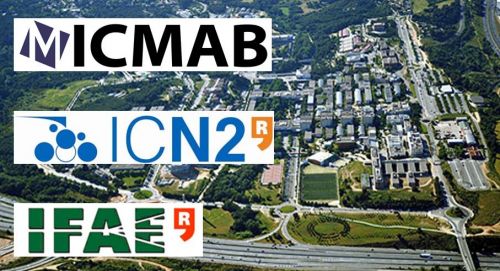
04/05/2017
Reference research centres in the environment of the Barcelona Synchrotron Park
Reference research centres in the environment of the Barcelona Synchrotron Park
The recently updated Nature Index, which tracks the researcher affiliations collected from worldwide high quality scientific articles, provides a good opportunity to speak about three important research centres installed on the campus of the UAB university, the Barcelona Synchrotron Park‘s partner: ICMAB, ICN2 and IFAE.
The Institute of Materials Science of Barcelona (ICMAB) has been recognized with many successes during these last years, including 9 ERC Projects awarded to its researchers. In the latest Nature Index, ICMAB is ranked in the top 4 research centres in Catalonia and Spain, only behind three other Catalan centres: the ICIQ (Institute of Chemical Research of Catalonia), the ICFO (Institute of Photonic Sciences) and the ICN2 (Catalan Institute of Nanoscience and Nanotechnology) also set up on the UAB campus.
The Institute for High Energy Physics (IFAE) also settled on the UAB campus, has been recently in the news: among the research team that published last month intriguing anomalies in the way some particles decay, 2 of the 5 researchers that analysed data from the Large Hadron Collider (LHC, CERN) and other experiments, are from the IFAE. If confirmed, these results would be a sign of new physics phenomena not predicted by the Standard Model of particle physics.
Finally, let’s mention that both ICN2 and IFAE, jointly with ICFO, ICIQ, IRB (Institute for Research in Biomedicine) and CRG (Centre for Genomic Regulation) form the new Barcelona Institute of Science and Technology (BIST) that aims to construct a scientific project based on the search for the complementary and interdisciplinary of fields, not only to promote the creation of innovative projects, but also to provide the most competitive environment for the training of scientists. According to Nature Index, BIST with its 1,400 researchers ranks 24 in Europe.
The Institute of Materials Science of Barcelona (ICMAB) has been recognized with many successes during these last years, including 9 ERC Projects awarded to its researchers. In the latest Nature Index, ICMAB is ranked in the top 4 research centres in Catalonia and Spain, only behind three other Catalan centres: the ICIQ (Institute of Chemical Research of Catalonia), the ICFO (Institute of Photonic Sciences) and the ICN2 (Catalan Institute of Nanoscience and Nanotechnology) also set up on the UAB campus.
The Institute for High Energy Physics (IFAE) also settled on the UAB campus, has been recently in the news: among the research team that published last month intriguing anomalies in the way some particles decay, 2 of the 5 researchers that analysed data from the Large Hadron Collider (LHC, CERN) and other experiments, are from the IFAE. If confirmed, these results would be a sign of new physics phenomena not predicted by the Standard Model of particle physics.
Finally, let’s mention that both ICN2 and IFAE, jointly with ICFO, ICIQ, IRB (Institute for Research in Biomedicine) and CRG (Centre for Genomic Regulation) form the new Barcelona Institute of Science and Technology (BIST) that aims to construct a scientific project based on the search for the complementary and interdisciplinary of fields, not only to promote the creation of innovative projects, but also to provide the most competitive environment for the training of scientists. According to Nature Index, BIST with its 1,400 researchers ranks 24 in Europe.
More news
28/01/2021
Institutional visit to the Elena Renewable Gas Plant in Parc de l'Alba
12/01/2021
2021: the Alba synchrotron begins its mutation
30/12/2020
The Park has a new Urban Development Master Plan
29/11/2020
The director of Parc de l'Alba, Pere Solà, academic director of the new Postgraduate Course in Urban Planning and Health at the UPC School
18/11/2020
Catalan minister Ramon Tremosa visits the ALBA synchrotron and announces the creation of a public-private investment fund to improve knowledge transfer
03/11/2020
Catalonia, at the forefront of Europe in life sciences and health; the Alba synchrotron contributes to this leadership









